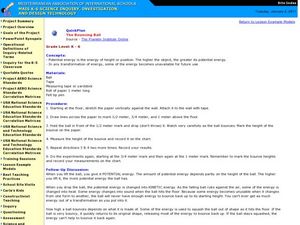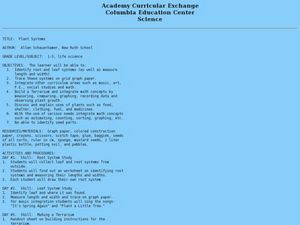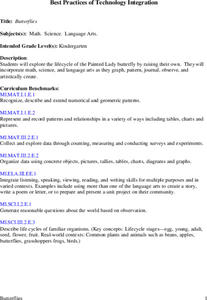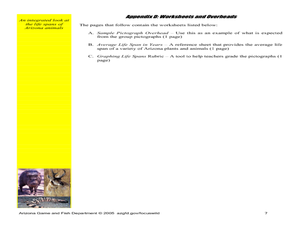Curated OER
Close Observation: Coins
Integrate math, science, and speaking/listening with a collaborative hands-on activity. Each group works with a single penny, examining it with the naked eye and recording observations. Repeat using magnifying glasses. Then repeat with a...
Baylor College
What Makes Water Special?
Get close up and personal with a drop of water to discover how the polarity of its molecules affect its behavior. Elementary hydrologists split and combine water droplets, and also compare them to drops of oil. Much neater than placing a...
Baylor College
There's Something in the Air
Clever! In order to compare indoor and outdoor dispersal rates for the movement of gases and particles through air, collaborators will participate in a classroom experiment. Set up a circular grid and set students on lines that are...
Baylor College
Heart and Lungs
With a partner, youngsters measure their pulse and breathing rates, both at rest and after running in place for a minute. While this activity is not novel, the lesson plan includes a large-scale classroom graphing activity and other...
Baylor College
Dust Catchers
In class, your emerging environmentalists construct dust catchers. They take them home for a week or two, and then bring them back into class to examine under a magnifier. From this activity, they learn what makes up dust and that...
Baylor College
Food Webs
Explore various ecosystems from around the world as your class discovers the interdependence of all living things. Using the provided sets of ecosystem cards, young scientists work in small groups building food webs to demonstrate the...
Baylor College
Digestion
Digestion is an amazing and complicated process that provides humans with the energy they need to survive. Lesson six in this series on the science of food uses sliced turkey and a meat tenderizer to demonstrate how enzymes help break...
SurfScore
Kodable
Prepare young scholars for life in the twenty-first century with this introduction to computer coding formatted as a fun problem solving game, this resource is a great way to develop children's sequential thinking...
Baylor College
Fungus Among Us
In order to learn that mold spores can be found in the air, observers grow bread mold and make observations for a few days. Afterward, they participate in a class discussion to arrive at the knowledge that bread spores are present in the...
Baylor College
Needs of Plants
What better way to learn about plant life than by creating a class garden? Young botanists start with a brief discussion about radishes before planting seeds and watching them grow. To determine the importance of water,...
Baylor College
Food for Kids
Immediately capture the attention of your class with the smell of freshly popped popcorn in the sixth lesson of this series on the needs of living things. Young scientists first use their senses to make and record observations of...
Curated OER
Growing Learners: A Multi-Disciplinary Approach to Investigating Plants and Flowers
Engage young scientists in these inquiry-based lesson ideas to spring into learning about nature.
Education World
Predicting Pumpkins
If you want more pumpkin seeds, you should get a bigger pumpkin—right? Young harvesters use estimation skills to make a hypothesis about how many seeds they will find in a pumpkin before examining the real number inside.
Curated OER
The Bouncing Ball
Learners use the scientific method to conduct an experiment to test how a ball bounces. In this inquiry-based physical science and scientific method activity, students drop a ball from specified heights and record the rebound, then...
Curated OER
Creating AB Patterns
Students work with patterns. In this pattern lesson, students find AB patterns in nature and the manmade world. They create their own AB pattern using math manipulatives and visual arts.
Curated OER
Plant Systems
Learners examine plant systems. In this life science lesson, students explore leaf and root systems on paper in a terrarium that they design and construct.
Curated OER
Butterflies
Students will explore the life cycle of the Painted Lady butterfly by raising their own. They will incorporate math, science, and language arts as they graph, pattern, journal, observe, and artistically create.
Curated OER
Nature Scavenger Hunt with Pedometers
Students integrate the study of plants/soil/rocks within a physical education classroom.
Curated OER
Charting Animal Life Spans
Second graders research animal life spans and complete related math activities. In this life span lesson, 2nd graders read How Many Candles and discuss life spans. Students arrange animal cards based on their life spans. Students find...
Baylor College
Do Plants Need Light?
Turn your classroom into a greenhouse with a lesson on plant growth. First, investigate the different parts of seeds, identifying the seed coat, cotyledon, and embryo. Then plant the seeds and watch them grow! Measure the new plants...
Baylor College
How Do We Use Water?
Send youngsters home to survey how they use water in their homes. Then bring them together to discuss which uses are essential for our health and which are not. A helpful video offers teaching tips for this lesson, and a presentation...
Baylor College
Healthy Homes
Meant to follow a lesson about how concentrated air particles can be inside of a building, this resource gets individuals to assess the possible air pollutants in their own homes. They take home a worksheet and circle spots on it that...
Baylor College
What is Air? Pre-Assessment
First, estimate existing knowledge about air with a class discussion. Then, hand out a 10-question pre-assessment quiz to record how much pupils know to compare to their knowledge later. This will also give mini meteorologists the...
Curated OER
Nutrition Lesson Plan
Second graders complete a survey as class answering the question: "Did you eat breakfast this morning?". They place a tally mark in the column that best represents their answer. They then discuss the results in the graph.
Other popular searches
- Integrated Math and Science
- Science Integrated With Math
- Math Integrated Into Science
- Integrated Math & Science























